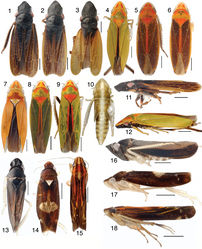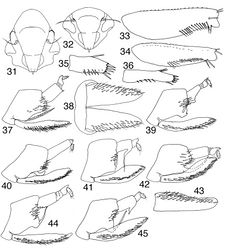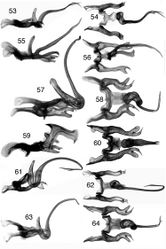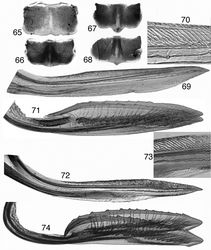Ilyapa longispina
| Notice: | This page is derived from the original publication listed below, whose author(s) should always be credited. Further contributors may edit and improve the content of this page and, consequently, need to be credited as well (see page history). Any assessment of factual correctness requires a careful review of the original article as well as of subsequent contributions.
If you are uncertain whether your planned contribution is correct or not, we suggest that you use the associated discussion page instead of editing the page directly. This page should be cited as follows (rationale):
Citation formats to copy and paste
BibTeX: @article{Dietrich2011ZooKeys124, RIS/ Endnote: TY - JOUR Wikipedia/ Citizendium: <ref name="Dietrich2011ZooKeys124">{{Citation See also the citation download page at the journal. |
Ordo: Hemiptera
Familia: Cicadellidae
Genus: Ilyapa
Name
Ilyapa longispina Dietrich, 2011 sp. n. – Wikispecies link – ZooBank link – Pensoft Profile
Description
Length male 5.9–6.2 mm; female 7.1–7.5 mm. Coloration as described for Ilyapa bifida except crown margin mostly white; apical margin of crown forming approximately right angle. Male pygofer processes slender, crossing posteromedially; anal tube with pair of retrorse posterolateral spines; plate apex angulate mesally. Anal tube processes long with apices curved ventrad; pygofer processes shorter, not meeting medially; apical process of aedeagus more elongate, with minute preapical spine posteriorly. Female seventh sternite with posterior margin trilobed with median lobe acute and larger than lateral lobes.
Material examined
Holotype male: PERU, Chanchamayo, 25 July 1960 (Salazar and Ramirez) [NCSU]. Paratypes: 1 male, same locality, 22 July 1960 (C. Ramirez) [INHS]; 3 females, same locality except 21 and 25 July 1960 [NCSU, INHS]. Other material: 3 males, PERU, Ucayali, 8 km E Abra La Divisoria, 1250 m, 9°9'57"S, 75°48'11"W, 25 October 2002 (R. A. Rakitov) sweeping, 02-39-2; 1 male, 1 female, PERU, Pasco, Yanachaga-Chemillén N.P., Puesto de Control Huampal, 1050 m, 10°1'09"S, 75°34'27"W, 8 October 2002 (R. A. Rakitov) on grass; 1 male, same data except Refugio El Cedro, 2420 m, 10°33'07"S, 75°21'27"W, 10 October 2002, D.M. Takiya, PE07; 1 female PERU, Junin, 1 km S Minapichita, 2100 m 11°6'1"S, 75°25'30"W, 19 October 2002 (C. H. Dietrich) sweeping, 02-20-1 [INHS].
Etymology
The species name refers to the long distal spine of the aedeagus.
Notes
This species may be distinguished by its moderately long crown and by the elongate, laterally directed distal spine of the aedeagus.
One specimen from Yanachaga-Chemillén National Park, Peru, has the distal spine of the aedeagus extended to the right, mirroring the condition found in other examined specimens of this species. Specimens examined from Yanachaga-Chemillén National Park have the anal tube processes considerably shorter than those in the type series from Chanchamayo, but such variation is here considered to be intraspecific. Based on the material available for study, this is the most widespread and common species of the genus.
Original Description
- Dietrich, C; 2011: Tungurahualini, a new tribe of Neotropical leafhoppers, with notes on the subfamily Mileewinae (Hemiptera, Cicadellidae) ZooKeys, 124: 19-39. doi
Images
|



